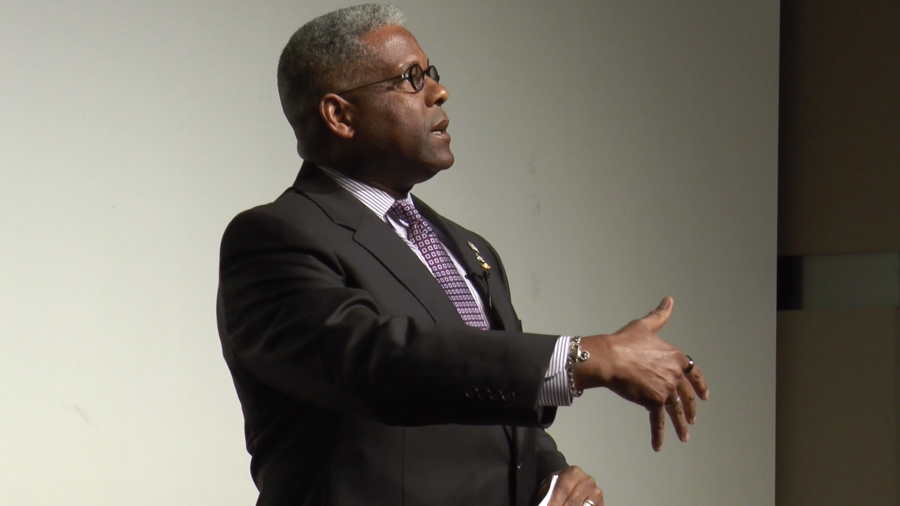Jack A. Hill, Ph.D. is a Professor of Religion at TCU and teaches a range of courses with an emphasis on social ethics. Hill wrote this commentary in response to an on-campus event featuring former U.S. Rep. Allen West, who spoke about ending radical Islamic terrorism.
Representative West’s “talk”—billed on numerous posters around campus as “Ending Radical Islamic Terrorism”—was vintage right-wing rhetoric about a perspective on foreign policy framed rather narrowly in terms of “self” and “the enemy.” As one questioner (Professor Dennis) noted, the speaker then conveniently avoided talking about the “self” part, and focused entirely on “the enemy”—which was characterized in terms of state and non-state actors. Regarding the latter, Mr. West quickly read a list of several so-called “Islamic Jihadist Groups” as epitomizing “the enemy.” Finally, the speaker summarized the usual 4-fold litany of neo-con strategies to defeat the enemy. That was basically it.
Yes, we can probably all agree that some of the groups mentioned do represent common enemies. The problem is—as several questioners tried to get acknowledged—the implied relationship…by the use of the term “Jihadist”…between these “terrorist enemies” and Islam as a faith tradition. In my understanding, in the Qur’an, “jihad” pertains primarily to “spiritual striving.” In a few contexts, it also has a more aggressive connotation that pertains to a right of self-defense. Significantly, the right of self-defense is in fact enshrined in the Christian just war tradition. In any event, it is a stretch to even suggest that a group such as IS practices jihad in either case, even though some actors in the IS movement have claimed otherwise. All of us might have gained greater insight by also focusing on “the enemy” within, rather than simply projecting an external enemy and depicting it in such narrow terms.
But as things played out in the Q & A, the image of a mixed metaphor came to mind—at once a boxing match where the goal is to punch out your opponent, not reason with them; and a Trump-style celebrity show where “the Strong Man”—in this case, Mr. West, summarily “one-ups” those suddenly “outed” as naïve, ignorant, or weak. Hence, the first questioner is demeaned as one who should sit down because he is “embarrassing himself.” The professor who actually knows a good deal of history is characterized as if he is ignorant of history (a kind of Karl Rove tactic of taking what is actually a person’s greatest strength and twisting it to look like a weakness). The student who actually cites statistics about the size of U.S. defense spending is rhetorically put on the defensive, not by engaging him in a discussion about those statistics, but by a bullying tactic; namely, “have you served in the military?” The implication being, of course, that if you haven’t, that somehow discredits your ability to even talk about U.S. defense.
This is the stuff of a brutal, hardball exhibition of retail politics. It is mean, nasty and, in essence, anti-intellectual. One of the questioners—who had previously confronted Mr. West when he spoke at SMU—noted afterward that West drastically “toned down” the substance of his remarks at TCU. Nevertheless, caustic, essentially ethnic slurs leaked out of this “tamer” stump speech. The leader of North Korea was called “the little fat guy with the real bad haircut.” I noticed an Asian student stand up and walk out at that point. The event was also structured as an un-level playing field in which virtually all participants who sought to ask questions were asked to queue up in the aisle on stage left. But when it became clear that the vast majority of these folks were challenging Mr. West in one way or another, the master of ceremonies walked the mic over to a young lady—clearly a West sympathizer —on stage right (who apparently was privileged enough not to get in line with the other eight or nine questioners).
In all, there was a striking lack of communication of knowledge in this circus-like event. My heart went out to all who courageously took a punch by standing tall and at least trying to engage Mr. West in genuine conversation. In this sense, at TCU we have not quite yet given up on the possibility of enlightenment and sincere dialogue which upholds the values of human dignity and respect for differences which Mr. West claimed to be espousing.




